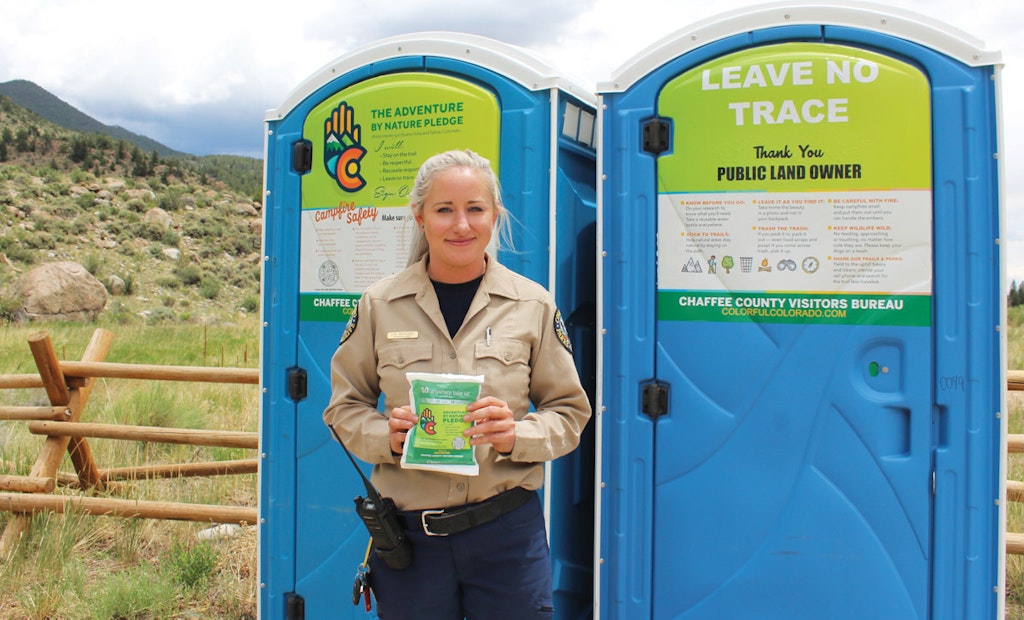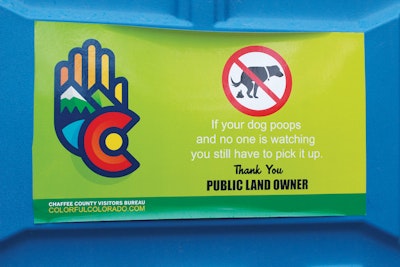
Lia Hovezak, a recreation ranger with the Arkansas Headwaters Recreation Area, is shown with two restrooms from Mr. Pots that are stationed on a trailhead in Chaffee County. The restrooms are wrapped with messages about fire safety and protecting wilderness areas. She is holding a waste alleviation and gelling bag hikers use to pack out their waste.
Interested in Portable Sanitation?
Get Portable Sanitation articles, news and videos right in your inbox! Sign up now.
Portable Sanitation + Get AlertsSince COVID-19 struck a few years ago, it seems like pumpers everywhere have taken the definition of “busy” to a new level. More folks staying home means more pressure on septic systems, and that translates to more emergency and routine maintenance calls for your service company.
Many of you also offer portable sanitation services, and the story there has been much the same. From the start, experts encouraged people to gather outdoors and take part in safer social situations such as picnics, hiking, biking and camping. And when COVID concerns started to ease, our favorite large special events returned with a vengeance.
What side of the wastewater industry is busier? We won’t speculate about that. But on the restroom side, the critical role portable sanitation plays in protecting the environment and our favorite gathering spots has become crystal clear.
One great example is playing out in the Rocky Mountains of Colorado, a mile-high mecca for outdoor enthusiasts. Chaffee County, a few hours from Denver and surrounded by 14,000-foot peaks, has become overrun by tourists since the start of COVID, and all of those people need places to relieve themselves. Hiking trails and dispersed campsites were receiving so much waste there was no more room for visitors to bury it. The waste piling up was causing a nuisance and public health danger.
RESTROOM GRANTS
The Chaffee Recreation Council, through its Keep it Clean initiative, stepped in and awarded grants to provide portable restrooms at 11 popular trailheads. The council gave Chaffee Common Ground grants to the Greater Arkansas River Nature Association and the Salida Mountain Trails group to provide the restrooms. Mr. Pots of Woodland Park, Colorado, placed 22 units at the start of the trails in June, and will continue to service them weekly throughout the six-month tourist season. The grants totaling $53,000 will cover the cost of the units and service for three years.
Five Arkansas Headwaters Recreation Area trails are the Tunnel View, Riverside, Elephant Rock, Rapid No. 4 and Stone Cabin. U.S. Forest Service locations are at the Browns Creek/Raspberry Gulch Recreation Area, South Cottonwood Creek, North Cottonwood Creek and Mushroom Gulch in the Fourmile Recreation Management Area. Salida Trail System locations are at Beasway as well as CR 108, CR 110 and Spiral Drive.
Until being slammed by COVID, visitors to popular Western recreational lands typically relied on “leave no trace” rules for going to the bathroom in the wilderness. Those include either hand-digging what is called a cat hole and covering up the waste or using a waste alleviation and gelling bag to carry out waste to dispose of in the trash once they reach civilization. Those solutions just weren’t satisfactory with the higher volume of visitors, according to Kim Marquis, outreach coordinator for Envision Chaffee County, which administered the new grants.
“There was an exponential increase in use of public lands. A lot of people bought tents and came with their bikes to try and enjoy the outdoors. It was recommended that people do things outdoors during the pandemic and that was partaken by lots of folks,” Marquis told me.
GIVING THANKS
Marquis said public land agencies have reported a recent 50% increase in tourist traffic, and that created a need for more wastewater facilities. Pit toilets or other more permanent solutions cost a lot of money and take time to gain approval and get built. That’s where portable restrooms provide a great service, she said. The restrooms can be placed quickly and cost-effectively, and they can be easily moved as needs change.
So far, the portable restrooms have been a big hit, Marquis explained.
“People are very thankful they are there. Chaffee County has hundreds of thousands of acres of public land and it’s not all accessible with portable toilets, but this is certainly much better than what we had before,” Marquis said. “Managing human waste was one of the major things we had to address and people are pleased. I hear a lot of ‘thank-you’s.’”
Popular campground areas were one problem. With repeated use and running out of areas to dig cat holes and dump waste, the end of summer could be an unsanitary mess at dispersed campgrounds that don’t have permanent facilities. Besides the trailheads, Marquis said there are many additional areas throughout the West where portable restrooms could be a positive solution to a waste problem.
“From a tourism perspective, if people show up to a dirty, stinky campsite, it’s not going to be a good experience for them. We want to have the infrastructure to serve our tourists in a good and sustainable way. Port-a-potties are such an obvious solution,” Marquis said. “We don’t know if using port-a-potties is the answer forever, but it’s a stopgap measure until we get more permanent toilets.”
Beyond the natural areas, Marquis said the portable restrooms help ease pressure on public and business bathrooms in the towns of Chaffee County. Without facilities in the recreational areas, visitors come down to the villages to use the bathrooms and dump their trash, overwhelming park workers and small businesses. Portable sanitation providers could target this potential customer base to provide units in more urban settings.
HELPFUL STICKERS
An interesting twist that has gained positive attention is the Chaffee County Visitors Bureau working with the GARNA and Mr. Pots to create and install informative stickers or wraps on the restrooms to help the public understand the “leave no trace” message and to promote fire safety in the tinder box that is the American West.
Marquis said the wraps were a “genius” idea.
“Any way to share education and help people learn so the people who come behind them can enjoy (nature) as much as they did is a great idea,” she said. Marquis envisions restroom users waiting in line and focusing on these important messages, such as watching for windy conditions that make fires more dangerous and picking up after pets.
Mr. Pots drivers are servicing the 22 units with included hand sanitizers weekly, but not all on the same route. Sales Manager David Royar said common sense dictates when and where the units are serviced in the rugged, mountainous region. “There’s one site where our drivers don’t like to go up to, with rough roads,” Royar said. The service truck has to go slow over the gravel roads to reach remote locations, but the company is happy to help the cause.
“They’re trying to divert feces from being out in the woods. They’re for a good purpose,” he said.
Royar explained the company was happy to include the promotional stickers on three sides of the units and they will place the same units on these sites for the duration of the contract. His only request was that organizers choose an adhesive that will allow the stickers to be easily removed once the units are no longer needed at the trailheads.
There has been one issue with the restroom service. Royar said hikers and campers have been depositing bagged human waste from the campgrounds and assorted trash in the units, which makes the services more time consuming. However, GARNA has installed trail cams at the restroom sites and tracks down offenders to ask them to dump waste from the plastic bags and into the holding tanks, he said.
RESTROOMS NEEDED
It’s encouraging to see partnerships like this one where wastewater professionals are working with nonprofit groups to provide a valuable service to ensure a cleaner environment and the public’s enjoyment of the vast American wilderness. The COVID pandemic sent millions of people out to explore the most beautiful places in this country. It has also highlighted the importance of spreading effective portable sanitation to these areas far and wide.
As an industry we have learned a lot from the pandemic, not the least of which is that the public will demand restrooms and clean service in many more locations and situations. It’s been a tumultuous period in history, but a time that confirmed over and over again that you provide an essential service to grateful users.






